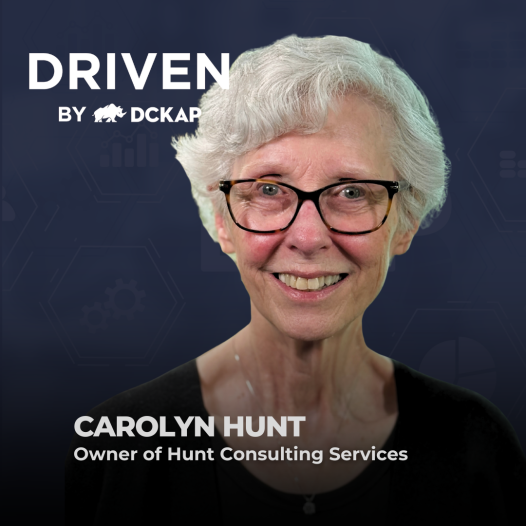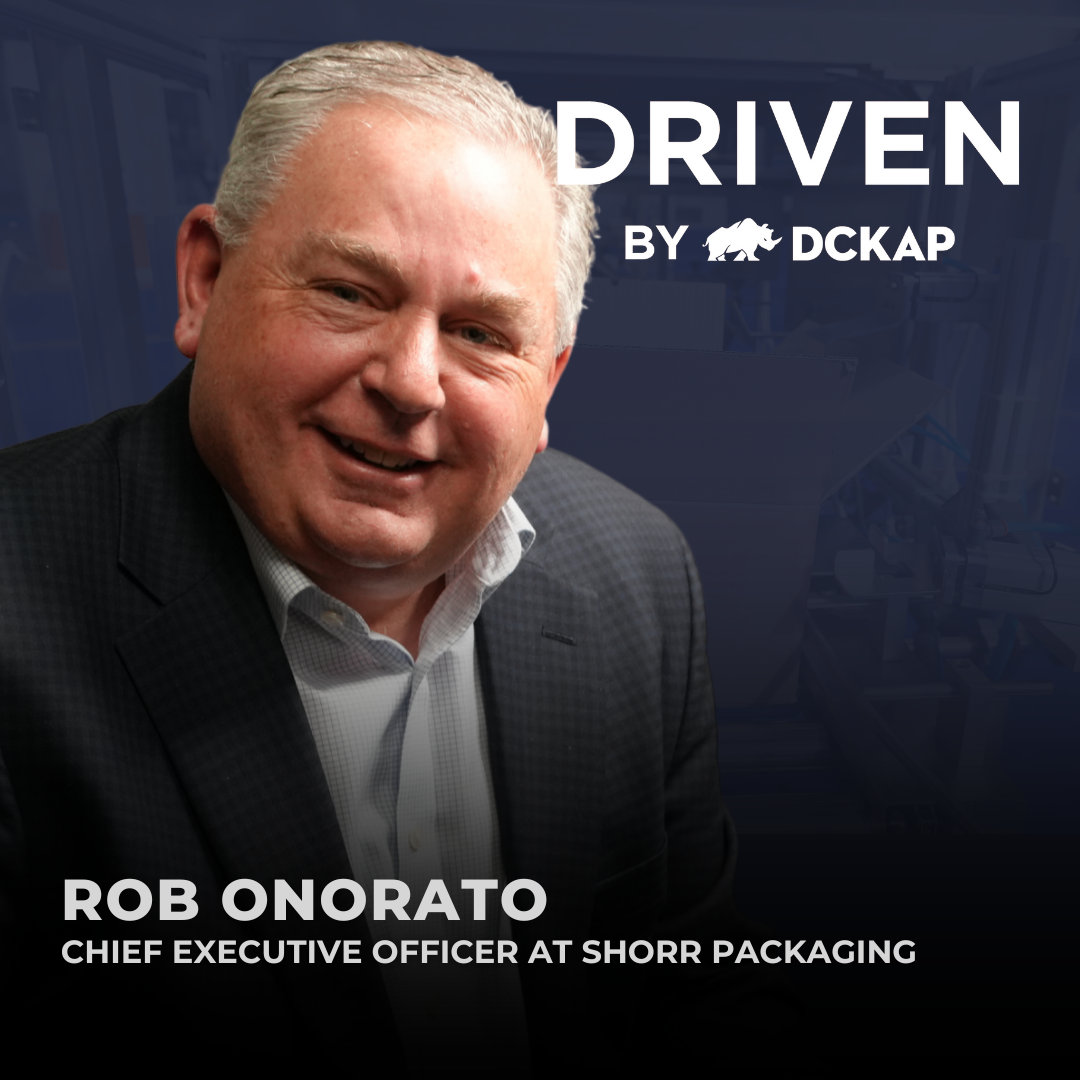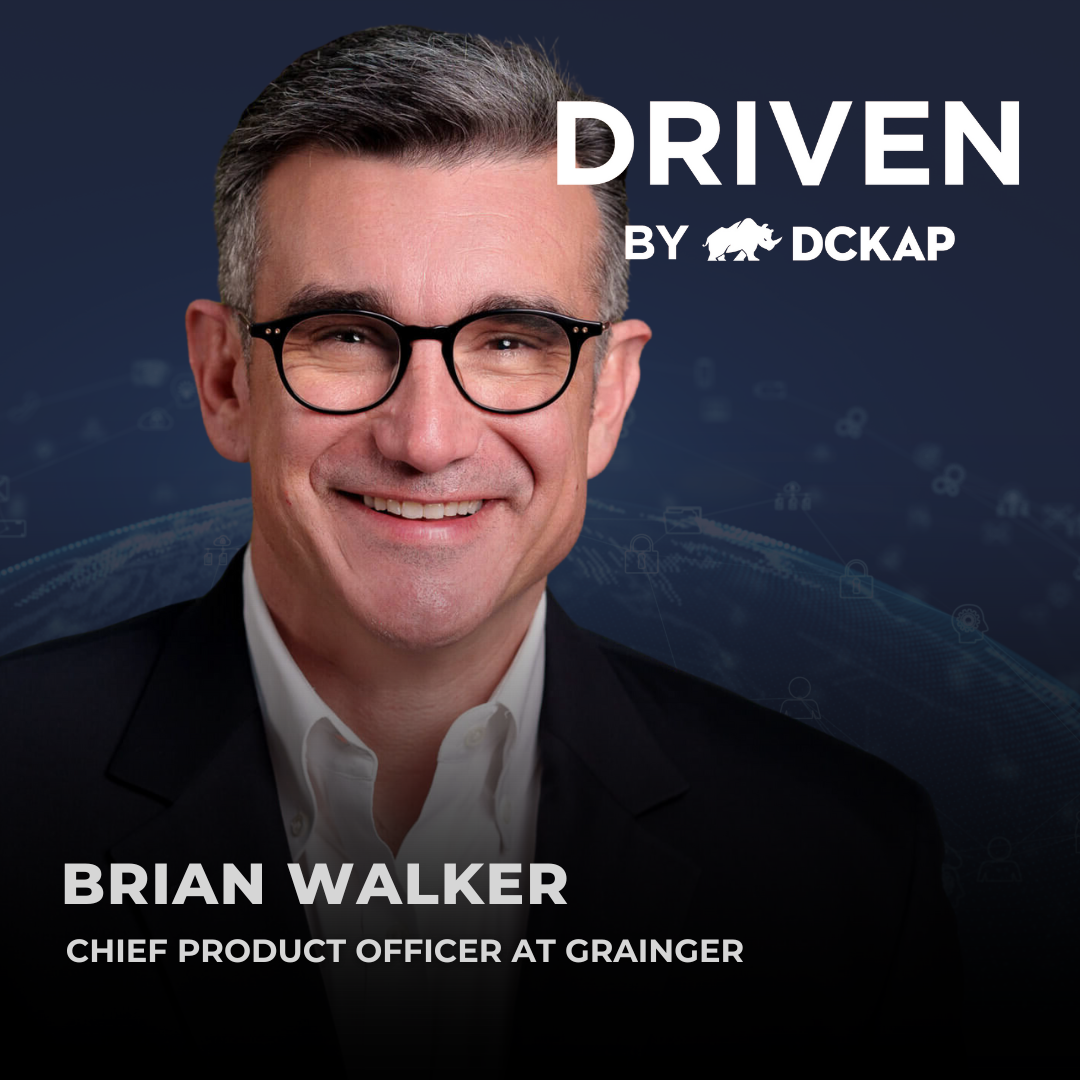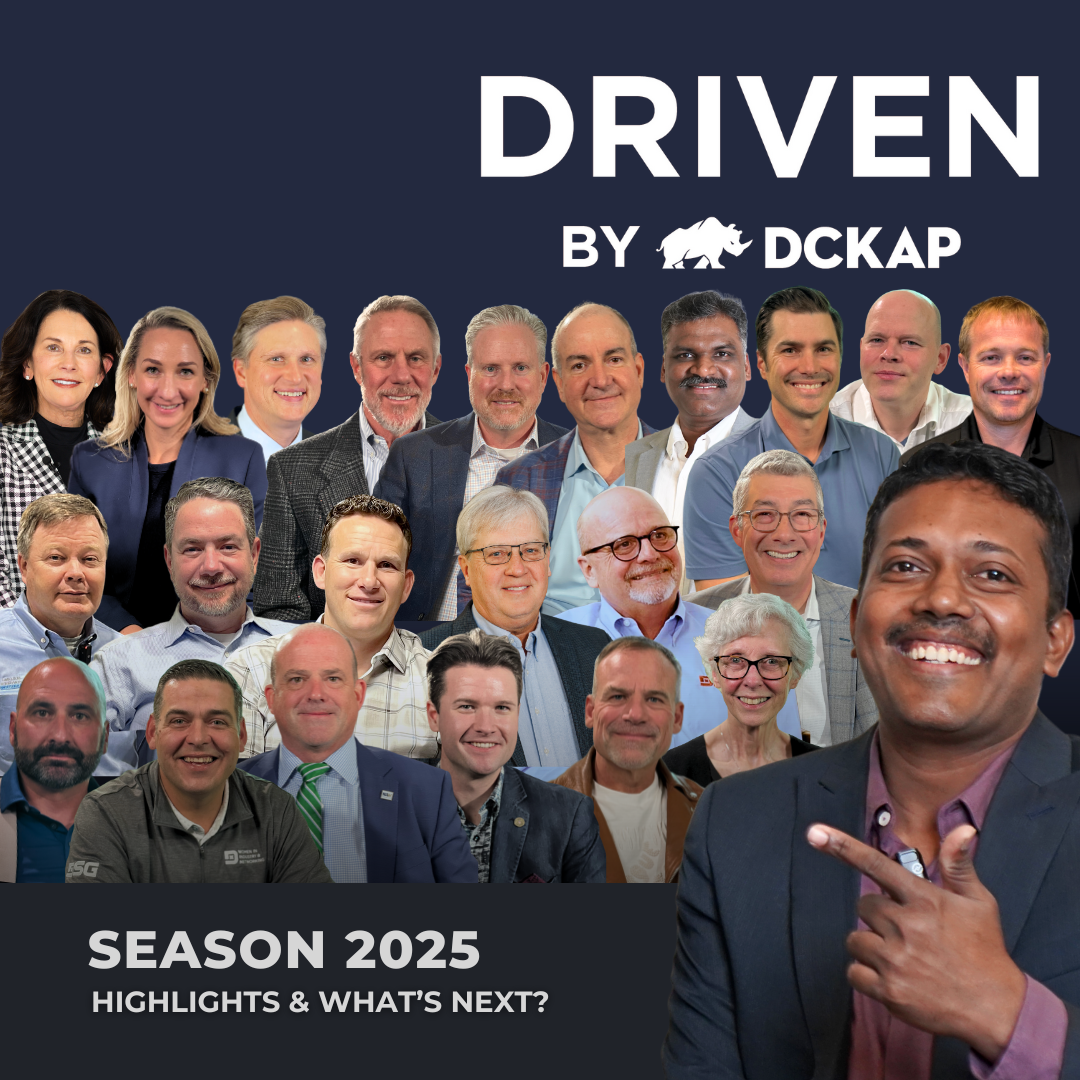Carolyn reveals practical insights from her decades of consulting experience, including how she’s helped countless businesses transition from paper-based accounting to fully integrated ERP systems. She discusses the critical role of system integrations, why no single ERP can do everything, and how platforms like DCKAP Integrator enable distributors to connect best-of-breed solutions. This conversation also explores the balance between AI automation and maintaining personal relationships in an industry built on trust and service.
OR LISTEN ON:
Karthik Chidambaram: Hello everyone. Welcome to a new episode of the Driven
by DCKAP podcast. Carolyn Hunt from Dallas, Texas is an independent
consultant specializing in the implementation of Epicor Prophet 21. She has
over 50 years of experience in industrial distribution and over 25 years
with Prophet 21.
Carolyn, welcome to the show.
Carolyn Hunt: Thank you very much. I appreciate you having me.
Karthik Chidambaram: So Carolyn, great to see you and excited for this
conversation. You have been in the industrial distribution for over 50
years, and specializing in Prophet 21 for 25.
Carolyn Hunt: Yes.
Karthik Chidambaram: So that's a lot. Right. So, I'm just curious, how has
the industry evolved over the years, from where you started?
Carolyn Hunt: Now the industry has really done a lot in the last, probably
the last decade more than any other time. 'cause I started working in
industrial distribution in 1968. So that gives your users your users, your
fans, an opportunity to see, you know, how long I've seen distribution grow.
Distribution started out as very probably the last major type of industry to
embrace technology. Lots of things were still being done manually. A lot of
them did very, very basic stuff just to get by. And as they've grown,
they've had to get into computer systems. Some of them kicking and
screaming. A lot of them had employees that didn't even know how to turn a
computer on. Much less how to conduct business with it.
So over the years I've seen these customers and a lot of these customers
I've known for maybe 25 years or more, learn to embrace technology. They
want to do third party applications now, when before, if they couldn't do it
inside of their core software, they just didn't touch it. They didn't do
B2B.
B2B became a big thing, you know, several years ago now, but it was not
something those of us in industrial distribution ever thought we would need,
because most of us in the industrial distribution realm built our companies
on relationships.
I mean, we provide services. We don't just sell things. We provide services
as well. Epicor Prophet 21 has helped us do that, and then third party
packages have helped us even grow that more. So the biggest change for me is
that maybe most of us are finally moving into the 21st century and really
embracing the technology,
Karthik Chidambaram: Embracing change. Do you remember your first consulting
engagement?
Carolyn Hunt: Very much so. I remember the very first one I did, and it was
really interesting because the first question they had was gee, when we
print a purchase order, we can't reprint it. You know, it just disappears
from the system and we don't know what to do. And I knew exactly what they
were doing that was making that happen.
So within an instant, I went from a fairly new consultant to being a hero. I
mean, it was like a very- I don't like to think I'm egotistical at all, but,
but it was a, a big high for me is that I was able to actually help this
customer figure out how to resolve their issues. And from there I worked
with that company for.
Golly, probably close to 20 years, all in all. And the event a couple years,
well, probably about five years ago, their owner passed away and they sold
to another company who unfortunately had a homeroom system that they wanted
to keep.
And so they went away from the Prophet 21 system. It wasn't in their best
interest to do that, but, you know, all you can do is try to help people
understand what this system can do and how important it is to the success of
your business.
Karthik Chidambaram: And when you solve problems, you always become a hero.
Carolyn Hunt: Yeah, like I said, it's a big ego trip. I mean, that you can
go in and either recommend a third party package that they didn't know they
had available to them, or maybe enhance, help them enhance a third party
package.
And a lot of times it's just helping them understand how the system works
and that they can do all kinds of things. Without going to third party
packages. I think in today's world, third party packages are almost
mandatory. There's just, I don't think there's any computer system out there
in the world that's going to do every single thing every customer wants.
I mean, just imagine what the cost of that kind of a system would be.
Exactly. So the cost of adding on a third party package is a whole lot less
than if you went out to try to find that Perfect answer.
Karthik Chidambaram: Exactly, and that's exactly the problem we solve as
well. Right? Because like you rightly said, you don't want one system to do
everything.
You get the best of whoever is offering what, right? And then, you know, we
make systems talk to each other, right? So you'll use our integration
absolute platform, right? The DCKAP integrator connects the third party with
the ERP. So yeah.
Carolyn Hunt: Yeah. There's no reason to reinvent the wheel. If there's a
really good application out there that can integrate with Epicor, then.
Why not? Epicor has taken some third party packages that they used to
promote, and they've brought some of those things in-house. Some of those
things they've done very well, and some of those things they haven't because
the other companies have been building on that platform for years and years
and years and years, and Epicor comes in almost green, so to speak, and are
trying to build one from scratch.
They do a decent job, but there's that other third party package is always a
step ahead of them. 'cause for everything they are learning that they can
do, you're probably already doing it. Yeah, exactly. So it's not, and I
think they have, I think that's one of the reasons they went to using APIs
as I think they finally realized that we don't have to have it all in-house.
Distributors still in today's world would like for everything to be
in-house. We want one contact, we want one company. We want one support
line. We have to call, we don't wanna have to call five different people to
get an answer to a question because each one we call goes, well that's not a
Prophet 21 problem, that's a so and so problem.
And then you call so-and-so. Well, that's a Prophet 21 problem. And a lot of
people got you know, kind of a negative. Connotation of using third party
packages because of that, and that's changed today. I think you get a
better, what I find is that most third party packages today know almost as
much about Epicor Prophet 21 as Epicor Prophet 21 does.
And I think that's a testament to, to folks like you that you take the time.
To learn how people are using it, how they, you know, what their pain points
are and you, you are, you are a partner and not just two software sitting
side by side. Yeah. Talking to each other, but not really communicating, if
that makes sense.
Karthik Chidambaram: Exactly. And automation and integration is the key,
like you rightly forward out. And also Epicor does a really good job at
this, right. In terms of. Like you said, you know, they understand that they
can do everything and if there's another solution out there which does
something better than them, hey, let the distributor choose that and then
use a platform like the DCKAP integrator to integrate these two systems.
Yeah. I'm just curious to understand the history of ERP. Right? So when you
started, what was the ERP like? How is it demand?
Carolyn Hunt: So when I started, we had a homegrown computer system in the
company that I first was working with, and it was written, happened to be
written by a friend of mine, and they had worked on this homegrown system
for a long time.
In those days, a lot of people did that. They found someone that could write
code and they weren't going out and buying, buying software. At the time
that Epicor first came into being, it was had proprietary hardware. So a lot
of people, my company was one of them that didn't want to buy them because
if I had a hardware problem, I was in Virginia at the time, they had to send
someone from Pennsylvania.
Karthik Chidambaram: And what was this hardware for?
Carolyn Hunt: It was to run the operating system of the original Prophet 21
Software. Oh really? Okay. And it's proprietary hardware, so some years
later. So, and for us, a computer at that point, honestly wasn't much more
than a calculator. It let us do certain things. Our, our version of it
didn't integrate with anything in accounting very well.
A lot of original ERPs didn't do that. They expected you to go buy some
other accounting software, and then Epicor went from their original version
to something they called a claim, which was using a risk 6,000. It wasn't
sql, I guess it was doll space and I'm not big on on software technology, so
that could be wrong, but that was, that was an enhancement.
They had an integrated accounting package. Wasn't great, but it was there
and it was part of this original package and they didn't offer third party
stuff. I mean, there just wasn't any way to integrate it. Very, very time
consuming system to use. Everything was reports. Everything, you know, you
didn't email anything out of the system that was just unheard of.
I mean, I, we were really excited when fax machines came about and our first
fax machine was probably the size of this room. So that's, that's the, the
good advantage of being old. See, as you get to see all these things, as the
world changes and, you know, now you do everything with your phone just
about, so from the acclaim software, they move to more to a sequel based.
It got even better. And then eventually they moved to web browser. And
honestly, me today, I think that's just the best thing they could have ever
done. They, they stumbled a little bit trying to get it started. I think
they were in a hurry to get it started and as such, maybe offered it a
little too soon.
But we all waited patiently before we made the change. And I mean, I have a
Prophet 21 system myself. I run my business on it. I use it a lot for just
doing testing and helping customers figure out why things are going wrong
with their system. But that's kind of the, you know, long story, gives you
the progression of where we went from almost like a calculator to a, you
know, to really something that almost does it all.
Karthik Chidambaram: Yeah. It's fascinating to see this evolution of an ERP,
right? Yes. Right from where it started to today. But, and I feel like, you
know, we're just scratching the surface and we have a long way to go, you
know, so it's really, really interesting. Tell us about ai. Right. So we
have seen technology kind of right when it started. And, you know, now where
we are talking about AI, so.
Carolyn Hunt: Well now I'm an old dog. Okay. And I love the concept of AI,
but. As a customer, I have to confess, a lot of times I don't like it. I
think the world is maybe moving a little too far away from human interaction
and I don't know that business will ever be fun as it is today if you can't
at least develop some relationships with human beings.
But there's phenomenal opportunity with ai. So hopefully we'll use it for
all the right things and not for all the, all the wrong things.
Karthik Chidambaram: No, definitely. Right. I mean it really depends on what
the AI does too, right? So I'll just share a personal story. I was checking
into the hotel and they had this automatic check-in.
I thought, okay, let me just check in automatically instead of going to the
human right. I mean, I just wanted to try it. Mm-hmm. Okay. I came in a
little lowly and let me check in, you know, and then I got a room, but I was
not too happy with the room they assigned to me. Right? And then I had to go
back to the hotel and then they said, Hey, you know, unfortunately they'll
not be able to change the room, you know, because it's already assigned.
But then you are right. I mean, I can relate to it a little bit. Let's say
had I gone to a human maybe right? The human could have told me, you know
what? This is a better room, or they, that's a better room. Room and all
that. Right? So I think that's one thing, but I also think it's a problem
with the system itself.
Right? Maybe if AI told me, right, Hey, show me all the choices. Mm-hmm.
Hey, this is what you're getting, then that could have been better. But it's
not there yet, but it's evolving
Carolyn Hunt: and I think. You're exactly right. I think my dislike, for
lack of a better word of ai, and I don't dislike it. I, I do see some, I do
some real value there.
But the same thing happened to my son. He and I are both here in Las Vegas
to have a mother son vacation in addition to working and. We tried the same
thing and, and we both hated it and we could not get it to work. So what was
funny is we went ahead and got in line to check in while he was doing the
app.
So figuring if he couldn't get it done, we wouldn't lose our place in wine.
So we were able to get to a human and get checked in. But, but you know,
internet, everybody wants you to do an app now. Nobody wants you to just,
you know, come in and talk to them and, and say, have a nice day. I hope we
just don't lose the humanity.
Karthik Chidambaram: No, I think that's very important. No, I totally
resonate with that. Right. As much as the AI talk and AI being there, AI is
very important. You know, we as humans need to leverage it, but then that
human touch elevates the whole experience in a big way. And those are the
companies, right, who leverage AI and also have that human touch.
They're the ones who are going to prosper, and they're the ones I wanna work
with.
Carolyn Hunt: Absolutely. Because I don't want people to lose sight of the
fact that the AI is still talking to a human being. I dunno what's gonna
happen when AI is talking to AI. God help us, I guess. Yeah. 'cause I just
don't know what's gonna happen. You know? That's gonna happen sooner or
later. But having him in touch, I think, is still important.
Karthik Chidambaram: In your career, spanning over 50 years, what has been
your most proudest moment?
Carolyn Hunt: Oh my goodness. There's been so many. I don't know that I
have- For me, my proudest moment is helping a customer solve a problem that
he knows is going to impact his business.
I get emails from customers periodically. I just got one recently. One of my
favorite customers, I've worked with them for years and years and years, and
he started out, when I first met him, they were still, and this has only
been a few years ago, they were still doing their accounting on the graph
paper.
They were still doing everything manually, and his father had started the
business and the father was doing the accounting and the father was not
gonna get away from paper. So what we did is, I came in and I showed them
how to make Prophet 21 work. And so in the background, the son and I were
doing the accounting inside of Prophet 21, making sure it still met the same
thing as the green graph sheets did. His father retired a few years ago and
now the son who owns the company has just sold it because he's ready to
retire now.
And he happened to sell it to another company. He was also a Prophet 21
user, but he sent me an email and he said, I just want to thank you for all
that you've done to help us. He said, these people told me that I was the
cleanest, best P21 system they had ever integrated into theirs. He said, and
he was giving me a lot of credit for that.
Well, in all honesty, the credit goes to him because he was the one that
made sure that we, we did things right and that he didn't give up and, and
just try to stay on the, on the paper side of things. So those probably are
my happiest moments when I can see that I've really helped him, not just,
not just solve a problem, but grow their business and, you know, keep the
right employees in the right jobs because it's.
It's just the best feeling in the world.
Karthik Chidambaram: Yeah. Not just solve a problem, but grow your business.
You know, I think that's very important.
Carolyn Hunt: Yeah. Grow. I mean, my goal is always to help them grow their
business without adding bodies, until the business has grown so much that
you just have to add a body. But I used to work for a company and I there
for 18 years and, and we didn't do a very good job at that way back when, so
every time our business grew, we had to go hire people.
So we basically rolled away all of our profit because everything we did was
adding more bodies. And as I grew and matured, hopefully in my career, I
tried to learn how to do things without adding more people.
Karthik Chidambaram: Yeah, absolutely right. You learn by doing things and
you learn by experience. You know, really well said.
The theme of this podcast is driven. You have been in the industry for over
50 years. What keeps you going and how are you driven?
Carolyn Hunt: It's the people, it's the customers I work with. I've often
told my customers that industrial distribution has been one of those
industries. In my opinion at least, it's still very, very customer service
oriented.
I think you find a lot of companies now, it's more about making a dollar and
they don't really care if you're happy or not. You're either gonna use their
product or not. And, and I don't know how people grow that way, but
obviously they do. But, we care. A lot of these companies are very family
oriented and for me it's a passion.
I always tell people, if you're gonna do anything in life, find the thing
that you're passionate about. It makes it fun. And I mean, my customers keep
telling me that, I hope you never retire, or I hope you don't retire until I
do. Because we all have really good relationships. And it kind of goes back
to that AI thing.
I mean, if I just had an automated solution thing for the customers, I'd
never get to know them.
Karthik Chidambaram: Exactly.
Carolyn Hunt: And that's what keeps me going. It's about the people and
relationships and not about just the agent, right?
Karthik Chidambaram: Yeah. Agent Carolyn.
Carolyn Hunt: Not like that. And, and for me, it's not just about making
money, it's about helping first.
And yes, I'm in the business for money, so sure. I mean, I need to make a
living, but I don't need to nickel and dime them to death. I don't need to
charge an exorbitant fee just because I can, you know, if I'm below what the
other people charge. I like that. Not because I want to make the other
people look bad.
I just feel like I'm getting a decent pay for the work I do. I don't charge
when I can't solve a problem because I feel like I've just wasted their time
talking to me because I couldn't really help them. I will have to say that
is- I think I can probably count on one hand with some fingers left over the
number of times that that's happened, but I've been extremely blessed to
have hundreds of mentors in my life.
Lots of people are willing to share what they know with me so that I can go
out and share it with my clients, and that drives me.
Karthik Chidambaram: That's awesome. Right? So these are great work ethics.
Everyone can learn from. Carolyn, I would like to end with this question.
What's something you're reading right now or something you're listening to?
Carolyn Hunt: Oh my goodness. Now that's a hard thing for me. The thing that
I will tell you, the thing that I haven't started rereading, so this is
gonna be a reread, is- you know, I'm not a, I believe in God, so, you know,
I'm not a super religious person, I guess, but I certainly believe in God
-is to go back and read the Bible.
And I've started doing that. I'm slow at it, but I've started doing that.
Karthik Chidambaram: So thank you so much, Carolyn. I really enjoyed
chatting with you on this Driven by DCKAP podcast.
Carolyn Hunt: Well, thank you.
Karthik Chidambaram: Thank you for being here.
Carolyn Hunt: Thank you for asking.
Sign up to receive email updates
Enter your name and email address below and I'll send you periodic updates about the podcast.




